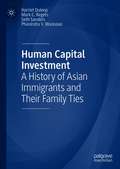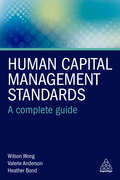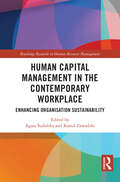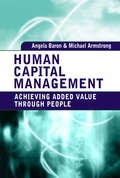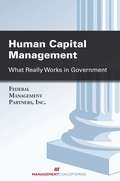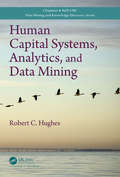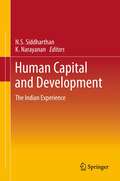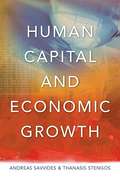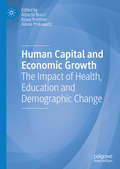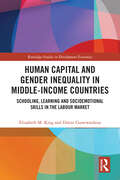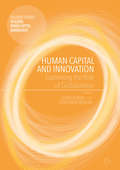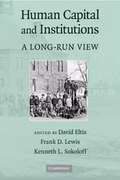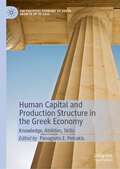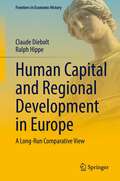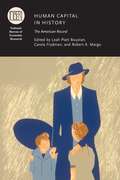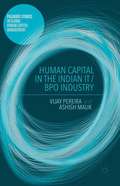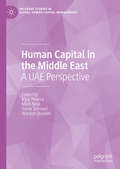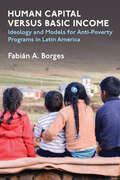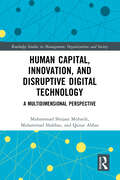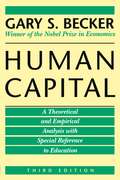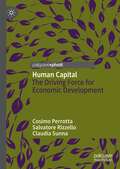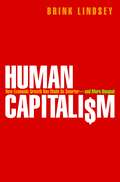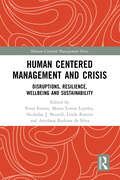- Table View
- List View
Human Capital Investment: A History of Asian Immigrants and Their Family Ties
by Phanindra V. Wunnava Harriet Duleep Mark C. Regets Seth SandersIn 1965, a family-reunification policy for admitting immigrants to the United States replaced a system that chose immigrants based on their national origin. With this change, a 40-year hiatus in Asian immigration ended. Today, over three-quarters of US immigrants originate from Asia and Latin America. Two issues that dominate discussions of US immigration policy are the progress of post-reform immigrants and their contributions to the US economy. This book focuses on the earnings and human capital investment of Asian immigrants to the US after 1965. In addition, it provides a primer on studying immigrant economic assimilation, by explaining economists’ methodology to measure immigrant earnings growth and the challenges with this approach. The book also illustrates strategies to more fully use census data such as how to measure family income and how to use “panel data” that is embedded in the census. The book is a historical study as well as an extremely timely work from a policy angle. The passage of the 1965 Immigration and Nationality Act set the United States apart among economically developed countries due to the weight given to family unification. Based on analyses by economists—which suggest that the quality of immigrants to the US fell after the 1965 law—policymakers have called for fundamental changes in the US system to align it with the immigration systems of other countries. This book offers an alternative view point by proposing a richer model that incorporates investments in human capital by immigrants and their families. It challenges the conventional model in three ways: First, it views the decline in immigrants’ entry earnings after 1965 as due to investment in human capital, not to permanently lower “quality.” Second, it adds human capital investment and earnings growth after entry to the model. And finally, by taking investments by family members into account, it challenges the policy recommendation that immigrants should be selected for their occupational qualifications rather than family connections.
Human Capital Management Standards: A Complete Guide
by Valerie Anderson Dr Wilson Wong Heather BondHuman Capital Management Standards is a complete guide to the BSI and ISO frameworks for human resources. Providing definitions, best practice guidance and evaluation metrics, this book will ensure that HR professionals are fully compliant with both UK and global HR frameworks. Covering everything from workforce planning and organizational culture to employee engagement, recruitment and redundancy, this book provides advice on all the key areas of an HR professional's role throughout the employee lifecycle from initial hire to exit. There is also additional coverage of the business standards which overlap with the human capital frameworks including governance, business continuity and ethics. Human Capital Management Standards will allow HR departments to implement effective people policies and processes based on robust research to create a supportive business environment and a productive workforce. This book also includes essential coverage of the standards assessment process and hints, tips and advice on how to achieve successful accreditation. With case studies from organizations who have made HR interventions based on these standards and a glossary to explain the language of standards, this is an indispensable guide for HR professionals in all organizations.
Human Capital Management in the Contemporary Workplace: Enhancing Organisation Sustainability (Routledge Research in Human Resource Management)
by Agata Sudolska and Kamil ZawadzkiNowadays, organisations are confronted with the imperative to enhance their organisational sustainability. This involves establishing an appropriate balance between the economic, ecological, and social aspects of an organisation's operations and striving to accomplish their economically viable goals that are both socially and environmentally responsible. By aligning the priorities and incorporating environmental, social, and economic factors into their operational strategies, organisations can generate value for themselves, while also making a positive impact on the current and future welfare of society and the environment. Noticeably, the advancement of organisational sustainability relies heavily on human capital management in the workplace.Today, more than ever, human capital is regarded as the foundation of organisations and ought to be treated as such. Given the pivotal role of human capital management for ensuring the long-term organisational sustainability of an organisation, emphasis should be placed on redefining leadership strategies and priorities, focusing on diversity and inclusion, cultivating talent, facilitating remote work, fostering employee engagement, promoting skill development for environmentally friendly practices, and prioritising job satisfaction and employee well-being.In response to the multi-faceted challenges of the third decade of the 21st century, this book provides an in-depth review of research avenues addressing present and future human capital development concerns in terms of enhancing organisation sustainability. The main aim of the book is to indicate the direction of demand for new competences regarding workplace human capital and identify synergies between its particular aspects with reference to contemporary human capital development. The monograph’s objectives include presenting tools that allow the analysis and development of human capital competences, pro-active and pro-environmental attitudes and behaviours, the coexistence of workers and AI in the organisation, as well as providing employee well-being, satisfaction, and commitment. Moreover, the book offers recommendations for contemporary responsible organisations that carry themselves towards the new economic and social order and sustainability.
Human Capital Management: Achieving Added Value Through People
by Michael Armstrong Angela BaronHuman Capital Management (HCM) has recently been described as a high-level strategic issue that seeks to analyze, measure and evaluate how people policies and practices create value. Put simply, HCM is about creating and demonstrating the value that great people and great people management add to an organization.This unique book describes how HCM provides a bridge between human resource management and business strategy. It also demonstrates how organizations can use the concepts of human resource management and the processes involved to enhance the value they obtain from people while continuing to meet their aspirations and needs.Baron and Armstrong explain how to achieve these objectives using various approaches including describing the concept of HCM and how the process works, discussing its application in numerous areas within an organization and examining the role of HR in HCM and the future of the concept.It also contains a toolkit which organizations can use to develop their own HCM policies and practices.
Human Capital Management: What Really Works in Government
by Federal Management Partners, Inc.Many federal agencies have made huge strides to develop, fully utilize, and enhance the effectiveness of their most valuable resource: their workforce. This book captures those successes and relates the stories behind them. Innovative recruitment and retention strategies, dynamic employee onboarding programs, leading-edge HR technology—these are some of the stories that offer valuable lessons for anyone dealing with human resources issues in government, business, or any other organizational environment. The authors highlight not only the successful outcomes of various agency programs, but also consider the bumps and hurdles encountered and overcome along the way. Rather than a theoretical presentation of what might, or should, work, Human Capital Management: What Really Works in Government provides thought-provoking and practical examples detailing what federal agencies are doing that is working.
Human Capital Readiness
by Robert S. Kaplan David P. NortonHow do organizations develop a measure of human capital (HC) readiness? This measure represents the availability of employee skills, talent, and know-how to perform the internal processes critical to the strategy's success. This chapter introduces a framework that enables organizations to identify HC requirements for the strategy, estimate the gap between the HC requirements and current employee readiness, and build programs to close that gap.
Human Capital Systems, Analytics, and Data Mining (Chapman & Hall/CRC Data Mining and Knowledge Discovery Series)
by Robert C. HughesHuman Capital Systems, Analytics, and Data Mining provides human capital professionals, researchers, and students with a comprehensive and portable guide to human capital systems, analytics and data mining. The main purpose of this book is to provide a rich tool set of methods and tutorials for Human Capital Management Systems (HCMS) database modeling, analytics, interactive dashboards, and data mining that is independent of any human capital software vendor offerings and is equally usable and portable among both commercial and internally developed HCMS. The book begins with an overview of HCMS, including coverage of human resource systems history and current HCMS Computing Environments. It next explores relational and dimensional database management concepts and principles. HCMS Instructional databases developed by the Author for use in Graduate Level HCMS and Compensation Courses are used for database modeling and dashboard design exercises. Exciting knowledge discovery and research Tutorials and Exercises using Online Analytical Processing (OLAP) and data mining tools through replication of actual original pay equity research by the author are included. New findings concerning Gender Based Pay Equity Research through the lens Comparable Worth and Occupational Mobility are covered extensively in Human Capital Metrics, Analytics and Data Mining Chapters.
Human Capital and Development: The Indian Experience
by Natteri Siddharthan Krishnan NarayananThe papers included in this volume cover several aspects of human capital. It starts with the role of human capital in influencing productivity, employment and growth of employment. The chapters show that Indian States that have been neglecting schooling and health facilities have become victims in terms of low productivity and lower rates of employment. Consequently, employment cannot be increased without spending on education and health. Furthermore, the unorganised sector in India cannot provide gainful employment as productivity in this sector is low and is also declining. Skill intensity influences mainly productivity in the organised sector. As a result, states that have been neglecting human capital would lose on both counts. The chapters also reveal that human capital could be substituted for energy use and help in reducing energy consumption and pollution. India is also one of the important exporters of human capital and the non resident Indians send remittances back to India. The volume indicates that remittances play a significant role in poverty reduction and increase in per capita consumption levels. In addition remittances, unlike foreign direct investments and portfolio investments, are less erratic and are not influenced by slowdown in the world economy. Poverty could also be directly attacked through the use of anti poverty programmes like NREGA. This volume provides an analytical framework and a theoretical model to analyse the impact of these programmes to examine their influence on labour demand, income, prices and productivity. The volume also emphasises the crucial role of the government in directly running education institutions. As seen from the volume government run engineering institutions are technically more efficient than the private run ones.
Human Capital and Economic Growth
by Andreas Savvides Thanasis StengosIn this book, Savvides (international economics, Cyprus U. of Technology, Cyprus) and Stengos (economics, U. of Guelph, Canada) focus on the connection between accumulation of human capital (education, job training, and general health, for example) and long-term economic growth. While they offer a brief discussion of the development of the theoretical literature on human capital and economic growth, their central focus is on analyzing and evaluating the extant empirical evidence concerning a link between human capital accumulation and economic growth. In addition to surveying the theoretical and empirical literature, they analyze a consistent data set using nonlinear estimation techniques in order evaluate the merits of various hypotheses on the link between human capital and economic growth. Annotation ©2009 Book News, Inc. , Portland, OR (booknews. com)
Human Capital and Economic Growth: The Impact of Health, Education and Demographic Change
by Alberto Bucci Klaus Prettner Alexia PrskawetzThis edited collection explores the links between human capital (both in the form of health and in the form of education), demographic change, and economic growth. Using empirical as well as theoretical perspectives, the authors investigate several important issues in the context of human capital, namely population ageing, inequality, public policy, and long-term economic development. Ultimately, they demonstrate that the accumulation of human capital is of crucial importance to long-run economic growth.
Human Capital and Gender Inequality in Middle-Income Countries: Schooling, Learning and Socioemotional Skills in the Labour Market (Routledge Studies in Development Economics)
by Elizabeth M. King Dileni GunewardenaThe role of cognitive and socioemotional skills alongside education in determining people’s success in the labour market has been the topic of a growing body of research—but previous studies have mostly missed middle-income countries and the developing world because measures of those skills and data on employment and earnings on large enough samples of adults have typically not been available. Using comparable survey data on these schooling, skills, and labour market outcomes from 13 developing and emerging economies worldwide, this book revisits human capital and gender inequality models. It presents new estimates of the returns to different levels of schooling as well as the cognitive and socioemotional skills for women and men. It examines whether those returns are due to levels of human capital or to structural bias in labour markets, and how these two factors work across the earnings spectrum. The book examines the existence of “glass ceilings” and “sticky floors” for women using this expanded measure of human capital. Further, by analyzing a group of countries of wide-ranging levels of economic development and sociopolitical contexts, the book reveals patterns and insights into how context mediates the relationship between skills and gender gaps in labour market outcomes. This book will be of interest to scholars of human capital, gender inequality in the labour market and development economics, as well as, gender and development policy makers.
Human Capital and Global Business Strategy
by Howard Thomas Howard Thomas Richard R. Smith Fermin Diez Richard R. SmithHuman capital- the performance and the potential of people in an organisation - has become an increasingly urgent issue for business leaders. Dramatic demographic shifts, the globalisation of organisations, increasing business complexity, and generational differences are causing many organisations to place a more deliberate focus on human capital as a key element in strategic planning and execution. This book helps business leaders determine how to address human capital as part of their business strategy, to drive value and realise the potential of the organisation. Topics are presented clearly, allowing readers to quickly grasp and apply key concepts and ideas. The authors share both their academic research and practical experience from around the world, providing first-hand case studies and examples to help bring theoretical topics to life. With a strong practitioner focus, this book will provide business leaders and HR professionals with new insights into how to improve business performance through a unique, strategic approach to human capital.
Human Capital and Innovation
by Sumit Kundu Surender MunjalThe second title in the Palgrave Studies in Global Human Capital Management series, this book explores how human capital contributes to innovation within the context of an inter-connected and globalized world. Investigating globalization as a phenomenon reflected within increasing cross-border flows of goods, services, know-how and talent, Human Capital and Innovation: Examining the Role of Globalization illustrates various facets of innovation at individual, team and organizational level. It highlights the influence of new economic realities, such as technological advances and the rise of emerging economies, on human capital and innovation.
Human Capital and Institutions: A Long-run View
by David Eltis Frank D. Lewis Kenneth L. SokoloffHuman Capital and Institutions is concerned with human capital in its many dimensions and brings to fore the role of political, social, and economic institutions in human capital formation and economic growth. Written by leading economic historians, including pioneers in historical research on human capital, the chapters in this text offer a broad-based view of human capital in economic development. The issues they address range from nutrition in pre-modern societies to twentieth-century advances in medical care; from the social institutions that provided temporary relief to workers in the middle and lower ranges of the wage scale to the factors that affected the performance of those who reached the pinnacle in business and art; and from political systems that stifled the advance of literacy to those that promoted public and higher education. Just as human capital has been a key to economic growth, so has the emergence of appropriate institutions been a key to the growth of human capital.
Human Capital and Production Structure in the Greek Economy: Knowledge, Abilities, Skills (The Political Economy of Greek Growth up to 2030)
by Panagiotis E. PetrakisThe role of human capital has diversified considerably in the last 100 years. Today, the prevailing perception seeks a sustainable, integrated development which is based on the triptych of environment, economy, and society. In this mode of development, human capital has a positive effect on the economy, on social cohesion and optimal governance, as well as on the ecological footprint.This book studies the critical role of human capital in the Greek economy and its production structure. In doing so, this book analyzes the Greek labor market, employment, and structural changes, among other facets of this vibrant economy.
Human Capital and Regional Development in Europe: A Long-Run Comparative View (Frontiers in Economic History)
by Claude Diebolt Ralph HippeHuman capital is of utmost importance for the future of our knowledge economies and societies. However, it is unequally distributed in Europe, contributing to marked spatial patterns of economic prosperity within and across countries. In many cases, these patterns have a long history. To understand them better, it requires to go back in time, when mass schooling was starting to become a reality across Europe. Taking a long-run perspective over more than 150 years, this book shows the development and the distribution of human capital in the regions of Europe and its connections with the economy. It provides insights into recent research findings in this area, including theoretical advances and the use of new empirical data.
Human Capital in History: The American Record (National Bureau of Economic Research Conference Report)
by Leah Platt Boustan Carola Frydman Robert A. MargoAmerica’s expansion to one of the richest nations in the world was partly due to a steady increase in labor productivity, which in turn depends upon the invention and deployment of new technologies and on investments in both human and physical capital. The accumulation of human capital#151;the knowledge and skill of workers#151;has featured prominently in American economic leadership over the past two centuries. Human Capital in History brings together contributions from leading researchers in economic history, labor economics, the economics of education, and related fields. Building on Claudia Goldin’s landmark research on the labor history of the United States, the authors consider the roles of education and technology in contributing to American economic growth and well-being, the experience of women in the workforce, and how trends in marriage and family affected broader economic outcomes. The volume provides important new insights on the forces that affect the accumulation of human capital.
Human Capital in the Indian IT/BPO Industry
by Vijay Pereira Ashish MalikHuman Capital in the Indian IT / BPO Industry analyses human capital management in the Indian information technology (IT) and business process outsourcing (BPO) industry, which has created a new paradigm for organising global talent engaged in designing and delivering IT and BPO services. The authors explore the evolution of the innovative talent management strategies of knowledge workers, which has received little attention in existing literature analysis. This book provides a rich theoretical grounding of managing human resources in the context of high-technology professional services firms, focusing on the design and implementation of high performance work system designs in the context of Indian IT/BPO organizations.
Human Capital in the Middle East: A UAE Perspective (Palgrave Studies in Global Human Capital Management)
by Mark Neal Vijay Pereira Yama Temouri Wardah QureshiProviding evidence of the role of human capital on innovation in the Middle East, this edited collection closely examines the unique nature of the workforce in this region. It highlights the challenges that the United Arab Emirates faces in becoming more globally competitive, with emphasis on its unique socio-cultural context and a rapidly changing institutional set up. Filling a growing need for research – particularly in the context of the UAE’s ambition to become one of the world’s most innovative countries – the authors address six main themes: happiness; employee incentives; the restructuring and integration of employees; inclusion and diversity; employer and nation branding; and human capital and innovation. This book examines the global best practices firms in the UAE need to adopt in order to overcome weaknesses, setting an agenda for future research in the context of human capital and human resource management for the UAE.
Human Capital versus Basic Income: Ideology and Models for Anti-Poverty Programs in Latin America
by Fabian A BorgesLatin America underwent two major transformations during the 2000s: the widespread election of left-leaning presidents (the so-called left turn) and the diffusion of conditional cash transfer programs (CCTs)—innovative social programs that award regular stipends to poor families on the condition that their children attend school. Combining cross-national quantitative research covering the entire region and in-depth case studies based on field research, Human Capital versus Basic Income: Ideology and Models for Anti-Poverty Programs in Latin America challenges the conventional wisdom that these two transformations were unrelated. In this book, author Fabián A. Borges demonstrates that this ideology greatly influenced both the adoption and design of CCTs. There were two distinct models of CCTs: a “human capital” model based on means-tested targeting and strict enforcement of program conditions, exemplified by the program launched by Mexico’s right, and a more universalistic “basic income” model with more permissive enforcement of conditionality, exemplified by Brazil’s program under Lula. These two models then spread across the region. Whereas right and center governments, with assistance from international financial institutions, enacted CCTs based on the human capital model, the left, with assistance from Brazil, enacted CCTs based on the basic income model. The existence of two distinct types of CCTs and their relation to ideology is supported by quantitative analyses covering the entire region and in-depth case studies based on field research in three countries. Left-wing governments operate CCTs that cover more people and spend more on those programs than their center or right-wing counterparts. Beyond coverage, a subsequent analysis of the 10 national programs adopted after Lula’s embrace of CCTs confirms that program design—evaluated in terms of scope of the target population, strictness of conditionality enforcement, and stipend structure—is shaped by government ideology. This finding is then fleshed out through case studies of the political processes that culminated in the adoption of basic income CCTs by left-wing governments in Argentina and Bolivia and a human capital CCT by a centrist president in Costa Rica.
Human Capital, Innovation and Disruptive Digital Technology: A Multidimensional Perspective (Routledge Studies in Management, Organizations and Society)
by Muhammad Shahbaz Qaisar Abbas Muhammad Shujaat MubarikHuman capital appears to be at the core of business strategies helping firms to recover from the catastrophic effects of COVID19 and bounce back effectively. The book in hand provides a diverse view of the human capital, its multifaceted role and application in an organization. The book also offers a comprehensive analysis on the role of human capital in industry 4.0, firm internationalization, and organizational ambidexterity and outlines strategies for the firm to improve its human capital readiness, keeping in view the contemporary business dynamics. A very simple and focused approach has been adopted through the book to make it readable for the people from the diverse fields. The book also focuses upon the conceptualizations and measurements of human capital in order to offer conceptual clarity of human capital to readers. A central focus of the book is how human capital interacts with and complements other organizational resources and technological developments. The book will be extremely useful for top-tier managers, researchers, academicians, consultants, and practitioners interested in gaining a current, relevant, and diverse perspective on human capital, its dimensions, and development.
Human Capital: A Theoretical and Empirical Analysis, with Special Reference to Education
by Gary S. BeckerHuman Capital is Becker's classic study of how investment in an individual's education and training is similar to business investments in equipment. Recipient of the 1992 Nobel Prize in Economic Science, Gary S. Becker is a pioneer of applying economic analysis to human behavior in such areas as discrimination, marriage, family relations, and education. Becker's research on human capital was considered by the Nobel committee to be his most noteworthy contribution to economics. This expanded edition includes four new chapters, covering recent ideas about human capital, fertility and economic growth, the division of labor, economic considerations within the family, and inequality in earnings. "Critics have charged that Mr. Becker's style of thinking reduces humans to economic entities. Nothing could be further from the truth. Mr. Becker gives people credit for having the power to reason and seek out their own best destiny."—Wall Street Journal
Human Capital: The Driving Force for Economic Development
by Cosimo Perrotta Claudia Sunna Salvatore RizzelloThis book presents a new interpretation of the role of human capital and the state in driving economic development. It places these ideas within broader debates within the history of economic thought to highlight how the nature of economic activity is a collective and coordinated process. Through examining how the welfare state reversed traditional accumulation by relying on human capital growth, the importance of the state within the development process is emphasised, alongside the multifaceted nature of competition. Different forms of public expenditure are then evaluated to identify the most productive forms of public spending and the drivers of long term economic development.This book questions the relationship between profits and rent and proposes a new kind of economic development based around human capital. It will be relevant to students and researchers interested in the history of economic thought, the political economy, and labour economics.
Human Capitalism: How Economic Growth Has Made Us Smarter--and More Unequal
by Brink LindseyWhy the rich are getting smarter while the poor are being left behindWhat explains the growing class divide between the well educated and everybody else? Noted author Brink Lindsey, a senior scholar at the Kauffman Foundation, argues that it's because economic expansion is creating an increasingly complex world in which only a minority with the right knowledge and skills—the right "human capital"—reap the majority of the economic rewards. The complexity of today's economy is not only making these lucky elites richer—it is also making them smarter. As the economy makes ever-greater demands on their minds, the successful are making ever-greater investments in education and other ways of increasing their human capital, expanding their cognitive skills and leading them to still higher levels of success. But unfortunately, even as the rich are securely riding this virtuous cycle, the poor are trapped in a vicious one, as a lack of human capital leads to family breakdown, unemployment, dysfunction, and further erosion of knowledge and skills. In this brief, clear, and forthright eBook original, Lindsey shows how economic growth is creating unprecedented levels of human capital—and suggests how the huge benefits of this development can be spread beyond those who are already enjoying its rewards.
Human Centered Management and Crisis: Disruptions, Resilience, Wellbeing and Sustainability (Human Centered Management)
by Nicholas J. Beutell Maria-Teresa Lepeley Peter Essens Linda Ronnie da Silva, Anielson BarbosaHuman Centered Management and Crisis: Disruptions, Resilience, Wellbeing and Sustainability is the new edited book of the Human Centered Management (HCM) Series developed to respond to surmounting concerns of global audiences and human centered scholars, practitioners and students searching for answers to better and objectively understand the effects of unprecedented Covid-19 pandemic disruptions and ongoing crises, affecting the wellbeing of people and workplaces since 2019. The effects linger and solutions are pressing. This new HCM volume presents analytical expertise and practical experiences of a team of international HCM scholars and practitioners targeting objective assessment of causes and effects of disruptions and offering coherent solutions applying HCM principles and practices. The book chapters include topics dealing with specific problem-solving strategies in numerous industries, among them, higher education, health care and entrepreneurship. The book will help readers worldwide to understand the challenges people and organizations are facing in the present global VUCA (volatile, uncertain, complex, ambiguous) environment. The audience will benefit from the book and its purpose to deliver enduring HCM solutions anchored in the wellbeing of people as precondition for organizations to secure high performance, quality standards and long-term sustainability.
